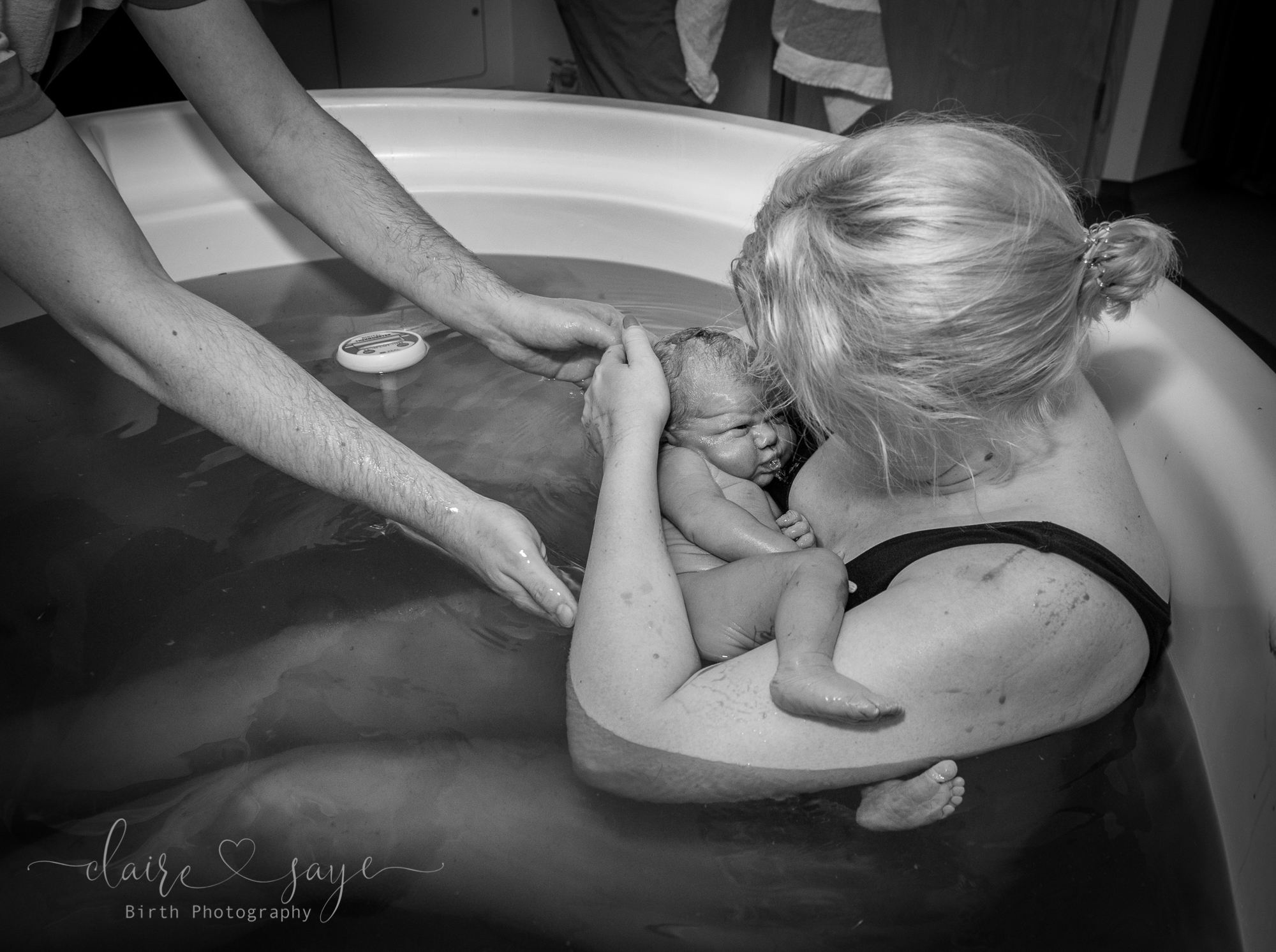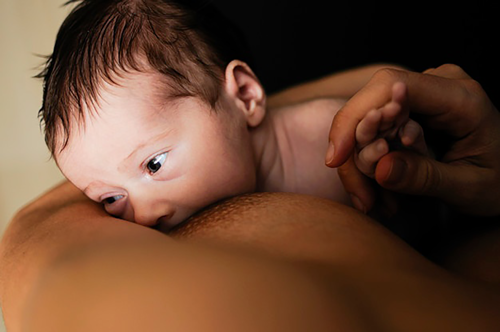The Golden Hour (and longer than that too!)
There is a precious period of time after we’ve given birth to our baby or babies, and it’s often called ‘The Golden Hour’. During this time you might be waiting for your placenta to be born, your uterus will be shrinking down to become smaller, closing off blood vessels to stop you from heavy bleeding, and your body should be flooded with the love hormone, oxytocin.
High levels of oxytocin are important at this time as it has three main effects:
- To help your uterus to shrink, release and birth your baby’s placenta and then shut off the blood vessels to ensure bleeding is normal,
- To initiate bonding between you and your baby,
- To trigger the release of milk from your breasts which helps to improve the chance that breastfeeding will be successful.

Oxytocin is boosted by:
- Holding your baby skin to skin, so not having your baby wrapped unless you want to,
- Smelling your baby, so you may wish to avoid using a baby hat,
- Exploring their little body and their tiny fingers and toes, so again, not having your baby wrapped,
- Giving your baby time to nuzzle, lick and perhaps latch to your breast without being interfered with, if you’re planning to breastfeed – or even if you’re planning to just give one, or a few feeds at the breast,
- Feeling safe and private, not exposed or ‘watched’.
People interfering with this process increases the chance that you’ll have heavier bleeding than normal, or a post partum haemorrhage (very heavy bleeding) so it’s extremely important that this golden hour is truly protected.
Sadly however, the golden hour is often unnecessarily interfered with. For instance, the midwife may want to do sutures (stiches), if needed, if it is important for the stitches to be done fairly quickly your midwife would let you know, this could be because of bleeding, however, often with no bleeding stitches can wait for a while. We may feel as though people are watching us, and uncomfortable about having our genitals looked at while they look for blood loss. Our babies are often taken away from us to be measured and weighed. While knowing your baby’s birth weight can be helpful, it doesn’t need to be done straight away, and you don’t need to hand your baby over unless you want to! They’re your baby and you decide whether to give them to someone else!
Baby’s may also be taken away to be looked at and checked over, but this can also happen on you and your baby can have checks completed whilst having skin to skin, or they can be delayed a bit too!
As a way to try to reduce this interference, many midwives now advocate for “the golden hour”. During this time you should be given peace to enjoy your baby and get to know them. You may wish to stay in the birth pool, if you birthed in one, or come out if you wish, or you could snuggle up on the bed, or somewhere comfy like the sofa. The midwife will be watching for signs that your placenta is birthing as it should and that your blood loss is healthy, but they should be discreet and respectful, and not just lift the sheet and say “let’s have a look, shall we?!”
You should not be moved elsewhere, such as the postnatal ward (if you birth in hospital), for at the very least this golden hour, and longer if you want more time.

If you want to have an actively managed placenta birth (this means to have the injection to release the placenta) rather than waiting for your body to birth the placenta itself, this can be done during the golden hour. You can still wait for your baby’s cord to become flat and pale (wait for white) before it is cut, if you want to, even if you have the injection. You can also wait for the cord to become flat and pale if you are having your baby’s blood group tested to see if they’re rhesus negative. The midwife can take the blood sample from the cord before it goes white, then she can hold a piece of gauze or cotton wool over the hole where the needle was to stop any minor blood leakage, just like they’d do with any blood test.
The golden hour should still be supported after a caesarean birth. If you’re not feeling well enough to hold your baby, or if you’re recovering from a general anaesthetic, which happens very rarely, you can still have someone hold your baby to your breast for you if you want to, which will help your uterus to shrink and also makes breastfeeding more likely to work well. If this is right for you, you will need to add this to your birth plan in advance, and talk to your midwife about who may be able to do this for you. However, most people who give birth by caesarean will be able to hold their baby quickly after the birth, and many doctors are now learning how to safely hand the baby straight to their mother or birth parent immediately after they are born, while still in the operating theatre.
Holding your baby or babies skin on skin after birth and letting them have free access to your breasts is also important for other reasons. This skin to skin contact:
- Helps to “seed” a baby’s microbiome – the good bacteria in their gut – which can be important for life long health,
- Helps to regulate a newborn baby’s body temperature,
- Helps to regulate the baby’s blood sugar, so is extra important for babies born to women or people with diabetes,
- Calms and reassures babies, so they’re more likely to relax and seek out the breast rather than crying and losing energy that they may need to feed well,
- Feels amazing!
Of course, sometimes it’s simply not possible to have an hour (or more) of undisturbed time with your baby. Babies who need extra help at birth, or who are very unwell, may need to be taken away for medical care. You may need to have treatment which can’t be done while you hold your baby. Sometimes it can be days, weeks or even months before parents can hold their baby, for instance if they’re born very prematurely. In these circumstances the golden hour can’t happen, and that can sometimes feel very sad.
In these situations, many parents find that once they are able to hold and really get to know their baby they can follow some of the golden hour principles, cuddling their baby skin to skin and getting to really know them. This can be very important for bonding after a difficult start. Snuggling your baby close is something that is important throughout their infanthood and not just something to do just after birth! However, protecting this hour where medically possible is very important and should be a normal part of midwifery care.
Summary
The Golden Hour is time that should be protected right after a baby’s birth where we get to know our babies without interference. It supports our body’s physiology and boosts oxytocin. Oxytocin right after birth is important for reducing the chance of heavy bleeding, as well as having a key role in bonding. Interfering with mothers and babies at this time can therefore increase the chance of heavy bleeding or haemorrhage, so The Golden Hour is very important to support and protect.

Leave A Comment